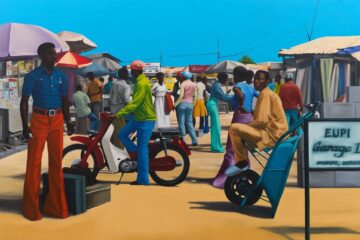
Palazzo Grassi announces “open-end”, a major monographic exhibition dedicated to Marlene Dumas, due to open to the public on Sunday 27 March 2022.
Palazzo Grassi presents the solo show dedicated to Marlene Dumas (1953, Cape Town, South Africa), as part of the cycle of monographic shows dedicated to major contemporary artists, launched in 2012 and alternating with thematic exhibitions of the Pinault Collection.
The exhibition, entitled “open-end”, is curated by Caroline Bourgeois in collaboration with Marlene Dumas. It brings together over 100 works and focuses on her whole pictorial production, with a selection of paintings and drawings created between 1984 and today, including unseen works made in the last few years. Presented over the two floors of Palazzo Grassi, Venice, the works exhibited come from the Pinault Collection, as well as from international museums and private collections.
Considered one of the most influential artists on the contemporary art scene, Marlene Dumas was born in 1953 in Cape Town, South Africa. She grew up and studied fine arts during the brutal Apartheid regime. In 1976, she came to Europe for further studies and settled in Amsterdam, where she still lives and works. If in the early years of her career she was known for her collages and texts, Marlene Dumas today works mainly with oil on canvas and ink on paper. Her work largely consists of portraits, which are universal representations of suffering, ecstasy, fear, desperation, but are also often comments on the act of painting itself. A crucial aspect of her work is her use of images from which she draws inspiration, be it in newspapers, magazines, film stills, films or polaroids she herself has taken. Of her work she says: “I am an artist who uses second-hand images and first-hand emotions”. (1)
Love and death, gender and race, innocence and blame, violence and tenderness are the major questions she raises, and which combine the intimate sphere with socio-political aspects, news stories and main topics of art history. Her work is based on an awareness that the endless flow of images we see daily impacts our perception of ourselves and our ability to read the world. For her, painting is a very physical act, revolving around eroticism and its different histories.
Marlene Dumas’ work focuses on the representation of human figures dealing with the most intense emotions and paradoxes: “Painting is about the trace of the human touch. It is about the skin of a surface. A painting is not a postcard.” (2)
The exhibition catalogue will be co-edited by Palazzo Grassi – Punta della Dogana with Marsilio Editori, Venice.
The exhibition will remain open to the public from 27 March 2022 to 8 January 2023.
Discover more: www.palazzograssi.it
(1) Marlene Dumas, Sweet Nothings. Notes and Texts, first edition Galerie Paul Andriesse and De Balie Publishers Amsterdam, 1998; and second edition (revised and expanded) Koenig Books London, 2014.
(2) Ibid.



